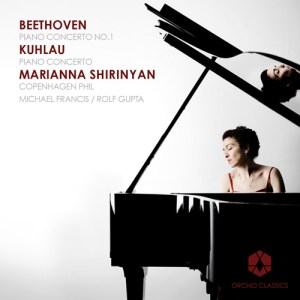 |
 |
|


alternatively
CD:
MDT
AmazonUK
AmazonUS
Sound Samples & Downloads
|
Ludwig Van BEETHOVEN (1770-1827)
Piano Concerto No.1 in C, Op.15 [36:10]
Friedrich KUHLAU (1786-1832)
Piano Concerto in C, Op.7 (1810) [31:18]
 Marianna Shirinyan (piano)
Marianna Shirinyan (piano)
Copenhagen Philharmonic/Michael Francis (Beethoven), Rolf Gupta (Kuhlau)
rec. Concert Hall of the Academy, Copenhagen, Denmark, October 2010
(Kuhlau)
and October 2011 (Beethoven).
 ORCHID CLASSICS ORC 100025 [67:28]
ORCHID CLASSICS ORC 100025 [67:28]
|
|
|
On my journey through life I’ve explored many highways and byways in
music.
I have been thrilled and surprised by so many wonderful discoveries but
just
as a ship eventually returns to harbour I’ve found that I always
eventually
return to Beethoven. However many times I set off to discover more I
always
know I shall be returning to him at some point. Beethoven is for me a kind
of
anchor and a benchmark against which I subconsciously appraise all other
music.
I’m sure I’m not alone in this though doubtless for others it
will
be a different name but I’m willing to bet that if not the majority
then
a high proportion will have the same musical anchor. It is said that the
exceptions
prove the rule and with very few I feel that Beethoven did everything
right.
His music is perfect in every way. There are never too many notes and
never
too few; if true genius exists then Beethoven was one.
After some lessons with his father Johann, Beethoven studied with Gottlob
Neefe,
who wrote in The Magazine of Music, following Beethoven’s
first
published work in 1783, “if he continues like this, he will be,
without
a doubt, the new Mozart”. Now there was a prophecy that held good!
Beethoven’s piano concerto no.1 was not the first he wrote but ended
up
being catalogued that way. It opens with an orchestral introduction that
is
at once charming and grand with more than a hint of the military. The
piano
joins in only after two and a half minutes picking up the theme from the
orchestra.
While there is a main theme there are several others that are subordinate
to
it, all with Beethoven’s incredible facility for innovation and the
writing
of brilliant tunes. It is not surprising therefore to read in the notes
that
soloist Marianna Shirinyan found it far more difficult to produce her own
cadenza
faced with Beethoven’s own suggestions for them while it was far
easier
in Kuhlau’s concerto to do the same. The slow movement’s core
is
an absolutely gorgeous theme with more than a hint of sadness and regret
and
is one that no one could ever tire of hearing. After such a reflective
movement
the final Rondo: Allegro scherzando takes one by surprise as it
fairly
leaps in with a jolly tune which is soon treated to a number of
improvisations
by both soloist and orchestra. The piano becomes almost jazzy around 2
minutes
40 in with a particularly humorous diversion. The whole movement is witty
and
fun and when the end comes it is the satisfying conclusion you expect from
such
a master of the genre.
Kuhlau became a friend and drinking companion of Beethoven’s a
couple
of years before Beethoven died. By that time Beethoven was stone deaf and
Kuhlau
was blind in one eye. One can imagine them in a pub where according to
Beethoven’s
notebooks they joked and wrote witty songs and discussed musical life. In
Kuhlau’s
piano concerto, his op.7 and also written in the key of C, you can
immediately
hear to what extent he was influenced by Beethoven’s first concerto
with
a main theme in the opening movement which is surprisingly similar to it,
in
fact almost a mirror image. While the concerto is charming and delightful
in
its own right it is not on the same plain as Beethoven’s whose
creative
ability and original thinking placed him in as much of a different league
to
his contemporaries as Mozart compared with Salieri and others active in
his
time. If people only ever drank blended whisky and enjoyed it they’d
be
perfectly happy with it. If they ever tried a good single malt then
they’d
never view the blended version in the same way again. That’s the
same
with any piano concertos written by others when Mozart, Haydn and
Beethoven
were at work. That said there’s plenty to admire and the slow
movement
Adagio is very affecting with some lovely and quite touchingly sad
moments.
The final Rondo: Allegro is also a well constructed movement with
which
to end a work. Kuhlau had every reason to be satisfied with it but must
have
been aware that it would inevitably be compared with Beethoven’s
work.
Long after Beethoven died other composers were mindful of the reputation
Beethoven
left behind him. It is well documented as to how Brahms always felt
intimidated
by the pressure Beethoven’s genius put upon his creative endeavours.
Nevertheless
Kuhlau’s piano concerto is pleasant enough offering plenty to enjoy.
Having
both concertos in C on the same disc makes for an interesting
juxtaposition.
The soloist Marianna Shirinyan, born in Armenia, living and working in
Denmark,
is a fine pianist. This was proved in 2006 when she won no fewer than five
prizes
at the ARD International Music Competition in Munich. Her debut album of
chamber
music by Chopin with cellist Danish Andreas Brantelid and Norwegian
violinist
Vilde Frang won the Danish “Grammy” (P2 Prisen). On this disc
she
delivers fine performances and receives great support from the Copenhagen
Phil.
I hadn’t heard the Kuhlau before and am pleased to have the chance
to
get to know it. This disc is a clever coupling and despite the obvious
comparisons
is worth having for at least that reason.
Steve Arloff
Masterwork Index: Beethoven
Concerto 1
|
|















